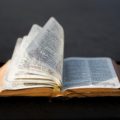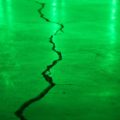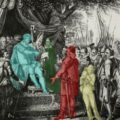Exodus: Bo: Briallen, May 21
This piece first appeared in Jewish Currents.
Bo
Exodus 10:1 - 13:16
Elmhurst, Queens
Dear readers,
The locusts are swarming, the darkness is descending, and the Lord is moving from house to house, killing each family's firstborn son if the doorway of their house is not painted with blood.
Bo, the third parsha of Exodus, begins with a devastating escalation of plagues ranging from ecological catastrophe to all-out massacre. "There was a loud cry in Egypt," we are told,
"for there was not a house without someone dead." By the end of the parsha, a chastened Pharaoh agrees to let God's people go, and Moses, Aaron, and the rest of the Hebrews escape the land of their enslavement by enacting the first Passover. But many questions remain unanswered. Will the Egyptians be permanently defeated by the plagues, or will they fight back? Is the Hebrews' escape an achievement of freedom, or does it forge a path toward new dangers? It's clear that the world has changed overnight, but it isn't yet clear what that means.
Attempting to interpret major historical events as you live through them can be a profoundly dissociative experience, and right now it feels very familiar. In particular, reading Exodus this spring has forced me to reckon in new ways with the question we are all grappling with: How do you read a plague?
As the world went on lockdown two months ago, commentators began staking out strong, and contradictory, principles of pandemical exegesis. Whatever you do, don't read a plague as a symbol, Paul Elie warned in "(Against) Virus as Metaphor," updating Susan Sontag's AIDS-era argument for our time. "We are going to see a profusion of metaphorical interpretations of the coronavirus," Elie wrote. "We'll be tempted to make them ourselves. But we must keep in mind the need for language to function in a literal sense, so that we can think clearly as we respond to the COVID-19 virus."
Elie is right that there are dangers in turning to metaphor in a time of illness. The "virality" of the internet is not the same as the virality of a virus, and such comparisons can confuse more than they clarify. Covid-19 and cat videos have little in common, after all. But despite these obvious truths, Elie's conflation of literal language and clear thinking seems suspect. What would it even mean to think without metaphor? How can we have complex thoughts without recourse to comparison and symbols? A literalist take on the pandemic offers facts without meaning.
For Arundhati Roy, on the other hand, the political opportunity of this moment relies on reading the pandemic as a metaphor. In "The Pandemic Is a Portal," an essay that went (metaphorically) viral last month, Roy recasts the devastation of mass death as a kind of revolutionary rupture that will lead to something better than the pre-coronavirus status quo. "Historically, pandemics have forced humans to break with the past and imagine their world anew," she writes in a dramatic conclusion. "This one is no different. It is a portal, a gateway between one world and the next. We can choose to walk through it, dragging the carcasses of our prejudice and hatred, our avarice, our data banks and dead ideas, our dead rivers and smoky skies behind us. Or we can walk through lightly, with little luggage, ready to imagine another world."
Roy's way of reading the plague has obvious appeal. It is redemptive and rousing. And I'm not immune (viral metaphors are unavoidable!) to the power of her vision. It would be wonderful if catastrophic devastation meant something other than itself—if it could be a force of liberation, even. But despite its attraction, I find Roy's way of reading a plague to be as troubling as it is stirring. Looking around me, I see no evidence that the pandemic is a portal to a better world, and I see abundant evidence to suggest that it is not. In its hopeful yet troubling take on suffering and death and its imagery of collective escape, Roy's pandemical exegesis is evocative of Exodus—one of the oldest surviving stories of people walking lightly, with little baggage, into another freer world that they were ready to fight for. Passover is the original pandemic-as-portal story. Like the coronavirus, the plagues in Exodus force us to reckon with the gap between the literal facts being narrated (a series of natural disasters and public health catastrophes) and what we are told they symbolically establish (the glory of God and the hope of liberation).
Both literalist and metaphorical approaches to reading Exodus are frustrating for me. A literalist reading of the plagues and their aftermath is simply grim. The story becomes a relentless catalog of misery and death that God inflicts on the Egyptians. It is too cruel to accept, and too meaningless to be useful. It's tempting to reject or revise the text. I remember going to my cousin's bat mitzvah and listening to her talk about the drowning of the Egyptians in the Red Sea, about Miriam's song of gloating at their deaths. I remember her telling the congregation, "I have talked with the rabbi and the cantor, and I've thought about this a lot, and I think drowning all the soldiers and horses was not a good decision. I believe if God had a do-over, he would make a different choice." I want to believe this too. There is no more maddening vision of God than the destroyer who keeps hardening Pharaoh's heart as an excuse to keep battering, slaughtering, and laying waste.
Most readers of Exodus, however, have disagreed with my cousin's understanding of the Egyptians' suffering as senseless decimation. They have taken Roy's side of the debate, seeing in the pestilence an onslaught of meaning. The Passover haggadah acknowledges the suffering wrought by the plagues—seder-goers are asked to dab drops of wine from their cups in dutiful remembrance—but it makes clear that even if these plagues caused harm, they were also understandable and necessary. Some haggadahs quote the sages Rabbi Eliezer and Rabbi Akiva, who read in a passage from Psalms the symbolic components of each plague: "He sent upon them the fierceness of His anger, wrath, and fury, and trouble, a sending of messengers of evil." These rituals and commentaries are consistent with the interpretive practices prescribed within Exodus itself. The text makes clear that God's own desire is for the plagues to be seen as "signs":
Then the LORD said to Moses, "Go in to Pharaoh; for I have hardened his heart and the heart of his servants, that I may show these signs of mine among them, and that you may tell in the hearing of your son and of your son's son how I have made sport of the Egyptians and what signs I may have done among them; that you may know that I am the LORD."
In this vision, the plagues—the river of blood, the rotting frogs, the pervasive sickness, the barley battered by hail, the fruit consumed by locusts, the darkness that lasts both day and night, the deaths of the firstborn—serve merely to provide richly meaningful writing material for the story of liberation that God is telling. This metaphorical way of reading the plagues, much like Roy's essay, offers us the fantasy that when destruction is unleashed, it will destroy the ruling class and liberate the enslaved. The destroyer will redistribute wealth, covering the bodies of the poor with the silver of the ruling class. The poor will escape to freedom, and the rich will die in place. I can imagine how thrilling it might be to read this story knowing God was on your side, and to feel the glory of that overturning. I can imagine how comforting it would be to believe that there was some sacrifice that could be made, some sign to paint on the portal of your apartment, that could keep you safe. But this story is not our reality. I am reading Exodus at a time when wealth is flowing the other way. Workers strike for hazard pay while billionaires get bailouts. The ruling class is fleeing to safety while the destroyer enters the doors of the poor. The only constant I can see between this pandemic and the plagues of Exodus is the presence of the Pharaoh with the hardened heart, and the chilling and overwhelming sublime of the bodies dying in their thousands.
There is a difference, of course, between reading a plague as a metaphor and reading an account of a metaphorical plague. Exodus was designed as a means of understanding freedom. Covid-19 was not. Even so, as I've been rereading Exodus, most of what I've been feeling is a refusal of any coherent interpretation it might support, liberatory or otherwise. Instead, I've been turning to it as a medium of textual connectedness—a way to self-isolate in company, turning the pages that others have touched.
The Bible I've been reading belonged to my paternal grandmother. She wrote her name in block capitals on a flyleaf, and marked the text with a few spare underscores, marginal lines, and circled phrases in ballpoint pen. In the years before she inscribed the Bible, she was diagnosed with incapacitating mental illness. She left her marriage. She lost custody of her children. In the aftermath of the loss, she found God. She read Exodus. Four years later, she died by suicide.
She drew a half bracket around this verse, in which God instructs the Israelites on the proper way to prepare a lamb for ritual consumption on Passover: "In this manner you shall eat it: your loins girded, your sandals on your feet, and your staff in your hand; and you shall eat it in haste. It is the LORD's Passover." I've been thinking about my grandmother in relation to this ancient vision of vigilance—of living restlessly under the threat of death. I'm thinking about everything she'd already lost when she read these words. About everything she was about to lose. Like Moses's mother, she knew what it was like to watch helplessly as her son was raised by someone else. She knew what it was like to leave everything behind, and to live in readiness for her next escape.
My dad was eight when she died. Recently he told me that when he was in his twenties and sailed from Rhode Island to San Diego via the Panama Canal in a two-person boat that barely had a motor, all navigation done by stars, he could only take one book. He brought his mother's Bible.
"I never read it," he said. "It was a totem." It has become a kind of totem to me too. I can't see God's glory in the signs of the times. All I feel is a loin-girded vigilance that cuts across time to connect me to the dead.
Love,
Bri
IN THIS SERIES:
ALSO IN THIS SERIES:
Slow Burn, Quarantine Ed.: The Book of Exodus Introduction
Slow Burn, Quarantine Ed.: Exodus: Shemot: Dan, April 25
Slow Burn, Quarantine Ed.: Exodus: Vaera: Len, May 6
Slow Burn, Quarantine Ed.: Exodus: Beshalach: Omari, May 27
Slow Burn, Quarantine Ed.: Exodus: Mishpatim: Sarah, June 23
Slow Burn, Quarantine Ed.: Exodus: Yitro: Jacob, June 23
Slow Burn, Quarantine Ed.: Exodus: Terumah: Carina, August 11
Slow Burn, Quarantine Ed.: Exodus: Tetzaveh: Pratima, August 11





